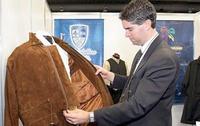-
Government plan for consolidated online ID unveiled
Last Friday President Obama unveiled a plan to establish federal standards to create consolidated secure online passwords; the ultimate goal of National Strategy for Trusted Identities in Cyberspace (NSTIC) is to create a more secure environment for online transactions where users only have to register once and can use a common password for multiple sites; NSTIC lays out the industry standards and technology policies around the new authentication methods but leaves the development and deployment of the technology entirely in the hands of the private sector to avoid the establishment of a government-led national ID; privacy advocates worry that it could create an environment where authentication is increasingly required
-
-
Firm pushes for open wireless sensor data
As wireless sensors are becoming increasingly ubiquitous in electrical grids, homes, and businesses, electronic enthusiasts and programmers believe that this data could be used to create a host of new devices with practical uses; making sensor data freely available allows engineers to build software and apps that monitor data in real time for things like local radiation levels, water quality, or even your home’s energy consumption; leading the push for open sensor data is U.K. based Pachube (pronounced “patchbay”) which has developed a network of sensors that collect six million points of data per day; the majority of sensor information is currently encrypted and therefore inaccessible
-
-
India bans Nokia push e-mail devices until govt. surveillance is allowed
BlackBerry’s maker RIM complained that the Indian government singled out its popular smartphone for harsh regulatory treatment because of the phone’s e-mail encryption which prevented Indian law enforcement services from snooping on e-mails of people suspected of involvement in terrorism or crime; now the Indian government is considering putting a hold on the sales of Nokia devices with push e-mail until monitoring systems were in place
-
-
70-kg plane available for $39,000
A Finnish company is offering a personal plane for about $39,000; the plane weighs only seventy kilograms; wingspan is nearly five meters, nose to tail 3.5 meters, and height 1.3 meters. maximum take-off weight is 200 kilograms; speed range is 70-140 km/h with a service ceiling of three kilometers
-
-
Abandoning nuclear power would cost Germany billions

Nuclear power is highly unpopular in Germany, and in the wake of the nuclear disaster in Japan, Germany chancellor Angela Merkel announced that Germany would abandon nuclear power generation (she called it “Atomausstieg,” or “nuclear exit”) and would gradually close its seventeen nuclear power plants; there is a debate in Germany about whether abandoning nuclear power would cost Germany 3 billion Euros a year – or only 2 billion Euros, as the government says it would
-
-
Experts: new U.S. nuclear reactors unlikely soon

Experts on a panel at Stanford University say radiation leaks at Japan’s Fukushima plant could impact the future of nuclear energy in the United States and abroad; they said that nuclear safety improved after the historic disasters at Three Mile Island and Chernobyl. Richter, and that it was improved further after the 9/11 attacks; they expect similar safety reviews by the U.S. Nuclear Regulatory Commission following the Fukushima accident
-
-
Rare Earth scientific breakthrough may increase their use
Rare Earth metals are a series of elements that represent one of the final frontiers of chemical exploration; the vigorous reactivity of these substances, however, has made it difficult for researchers to transform them into stable materials with well-defined structures; when researchers succeed, the payoff can be enormous — rare Earth compounds have important applications in areas ranging from catalysis to clean energy
-
-
Mexico violence boon to security garment industry

The deteriorating security situation in Mexico is a boon to the security industry; the Ninth Expo-Seguridad in Mexico City saw many companies offering bullet-proof garments — vests, scarves, shirts, and underwear — that protect against attacks with sharp objects; also on display was the more traditional personal protection gear such as helmets, gloves, goggles, and bullet-proof vests able to stop rounds from AK-47 and AR-15 assault rifles; one star of the show was Colombian businessman Miguel Caballero who is known for the bullet-proof jackets and vests he has produced for politicians, businessmen, and former presidents from across Latin America
-
-
3-D scanner iPhone app developed
A Georgia Tech researcher develops an iPhone app that allows users to take 3-D scans of faces or other objects and share them by e-mail; in the latest update, users can also e-mail animated videos of their 3-D models; “There are professional, $40,000 3-D scanners out there; this won’t perform like those do, but for anything under $100, this is your best bet,” says the researcher
-
-
Premier U.S. physical security event bigger, broader than last year's
The International Security Conference & Exposition, also known as ISC West, was held in Las Vegas last week; the show saw a 10 percent increase in overall attendance over last year’s show, and also a 7 percent increase in end-user attendance; the show floor — at 15,000-square-feet it, too, was larger than it was last year — featured more than 10,000 products from more than 900 exhibiting companies
-
-
Shoring up U.K. infrastructure essential to country's welfare
The United Kingdom suffers from some of the most congested infrastructure in the developed world and a failure to invest in these will have serious impacts upon the country’s long-term economic future; improvements to transport, energy, and ICT infrastructure could increase GDP by an additional 0.7 percent
-
-
Interest in water technology and business grows
Some 3,000 foreign visitors and more than 25,000 local participants are expected to attend the November 2011 WATEC, one of the world’s premier water technology events; the emphasis of this year’s conference and exhibition, the be held in Israel 15-17 November, will be on showing how water technology translates into successful projects and enterprises — both for the developed world and those at risk of severe water insecurity; there are about 400 water technology companies in Israel; 200 of them are already exporting their technologies to other countries — exports estimated to be between $2.5 billion and $3.5 billion in 2010
-
-
Hi-tech goggles to reduce number of friendly fire incidents

The modern battle-field is saturated with autonomous, remotely controlled platforms and weapons, and everything moves very fast; in addition, many of the engagements take place in close quarters; all these increase the risk of friendly fire; DARPA wants a small New York company to develop augmented reality goggles which will tell soldiers on the ground which air assets are nearby, bearing which weapons, thus resulting in more accurate destruction of enemy assets, less risk to friendly forces, and fewer civilian deaths
-
-
Demand for gov. cybersecurity specialists outstrips supply
The demand for IT personnel continues to grow, but there has been a subtle shift with regard to the qualifications most sought after; new studies found that professionals with the right IT skills and an active government security clearance earned 12 percent more than non-cleared personnel; in the Washington, D.C., area, the pay bump is 20 percent
-
-
Iris recognition on the go
Hoyos showed its iris-recognition-on-the-go solution at ISC West last week; most iris recognition solution require the persons to be identified to stand still and stare into a panel for a couple of seconds; the Hoyos solution allows people, after the initial enrollment, to just walk through a gate or a door; the iris scanner is mounted at the top of the frame, and it can recognize up to fifty individuals a minute as they walk through; individuals wearing glasses enroll without their glasses on, but once enrolled, they can walk through the door with their glasses on without disrupting the system’s recognition process
-
More headlines
The long view
Need for National Information Clearinghouse for Cybercrime Data, Categorization of Cybercrimes: Report
There is an acute need for the U.S. to address its lack of overall governance and coordination of cybercrime statistics. A new report recommends that relevant federal agencies create or designate a national information clearinghouse to draw information from multiple sources of cybercrime data and establish connections to assist in criminal investigations.
Trying to “Bring Back” Manufacturing Jobs Is a Fool’s Errand
Advocates of recent populist policies like to focus on the supposed demise of manufacturing that occurred after the 1970s, but that focus is misleading. The populists’ bleak economic narrative ignores the truth that the service sector has always been a major driver of America’s success, for decades, even more so than manufacturing. Trying to “bring back” manufacturing jobs, through harmful tariffs or other industrial policies, is destined to end badly for Americans. It makes about as much sense as trying to “bring back” all those farm jobs we had before the 1870s.
The Potential Impact of Seabed Mining on Critical Mineral Supply Chains and Global Geopolitics
The potential emergence of a seabed mining industry has important ramifications for the diversification of critical mineral supply chains, revenues for developing nations with substantial terrestrial mining sectors, and global geopolitics.
